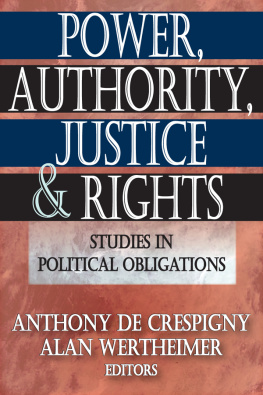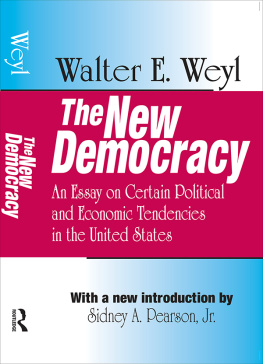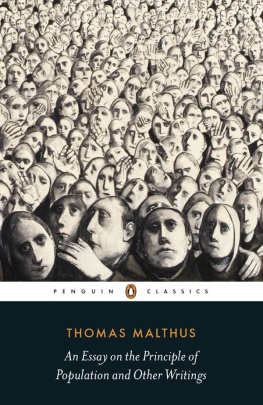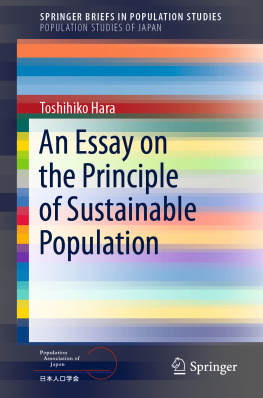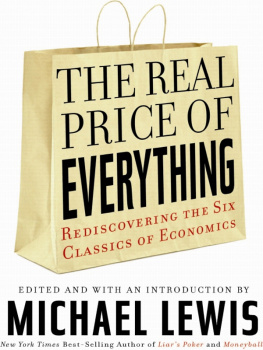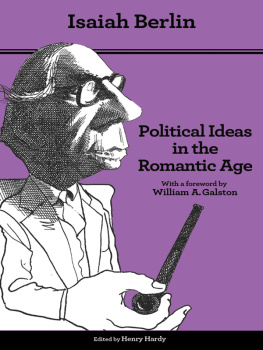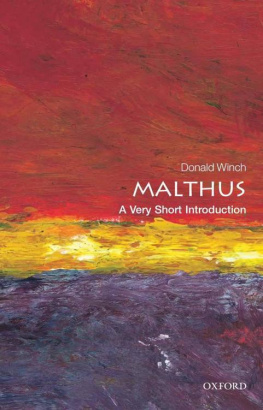Rethinking the Western Tradition
The volumes in this series seek to address the present debate over the Western tradition by reprinting key works of that tradition along with essays that evaluate each text from different perspectives.
EDITORIAL COMMITTEE FOR
Rethinking the Western Tradition
David Bromwich
Yale University
Ian Shapiro
Yale University
Steven B. Smith
Yale University
Shannon C. Stimson
Georgetown University
An Essay on the Principle of Population
The 1803 Edition
THOMAS ROBERT MALTHUS
Edited and with an Introduction by Shannon C. Stimson
with essays by
Niall OFlaherty
Deborah Valenze
E. A. Wrigley
Kenneth Binmore
Karen OBrien
Yale
UNIVERSITY PRESS
New Haven & London
Copyright 2018 by Yale University.
All rights reserved.
This book may not be reproduced, in whole or in part, including illustrations, in any form (beyond that copying permitted by Sections 107 and 108 of the U.S. Copyright Law and except by reviewers for the public press), without written permission from the publishers.
Yale University Press books may be purchased in quantity for educational, business, or promotional use. For information, please e-mail (U.K. office).
Set in Times Roman type by Newgen North America.
Printed in the United States of America.
Library of Congress Control Number: 2017935592
ISBN 978-0-300-17741-1 (paperback : alk. paper)
A catalogue record for this book is available from the British Library.
This paper meets the requirements of ANSI/NISO Z39.481992 (Permanence of Paper).
10 9 8 7 6 5 4 3 2 1
Contributors
Kenneth Binmore, CBE, FES, FBA, is Research Fellow in Economics, Finance and Management, Bristol University.
Karen OBrien is Head of Humanities and Professor of English Literature, University of Oxford.
Dr. Niall OFlaherty is Lecturer in the History of European Political Thought, Kings College London.
Shannon C. Stimson is Thomas and Dorothy Leavey Professor, Georgetown University, and Professor Emerita, University of California Berkeley.
Deborah Valenze is Ann Whitney Olin Professor of History, Barnard College, Columbia University.
E. A. Wrigley is former Professor of Population Studies, London School of Economics; Professor of Economic History, University of Cambridge; and cofounder of the Cambridge Group for the History of Population and Social Structure.
Contents
Shannon C. Stimson
Texts
.
Niall OFlaherty
Deborah Valenze
E. A. Wrigley
Kenneth Binmore
Karen OBrien
Acknowledgments
This volume has had a lengthy gestation, and the editor wishes to acknowledge the intellectual and critical assistance of several individuals of special importance to its completion. The project has received both critical advice and continued encouragement from four valued friends and colleagues: Ruth Collier, Murray Milgate, James Moore, and Ian Shapiro. The manuscript received careful and immensely helpful readings from two anonymous press reviewers. It was brought to completion with the excellent and timely assistance of Samuel Garrett Zeitlin and Joanna Williamson. Finally, I wish to express my gratitude for the exceptional patience and unfailing cooperation of the five scholars whose essays accompany and inform this complete edition of Malthuss 1803 Essay.
Introduction
SHANNON C. STIMSON
Thomas Robert Malthus, called Bob or Robert within his family, was born in 1766 at The Rookery, a country house in Wescott, near Dorking in Surrey, the sixth child of Daniel and Henrietta Malthus. Daniel Malthus was a country gentlemen of independent means and moderately radical opinions, an acquaintance of both David Hume and Jean-Jacques Rousseau, and an inspired devotee of the latter. The details of the young Malthuss life in the bosom of his large and closely intermarried family circle are reminiscent of a Jane Austen novel: the affectionate and indulgent mother of well-established societal standing; the mercurial, imperative, and peripatetic father. Malthuss parents were second cousins and were themselves the product of more than a century of intermarriage among four families: the Daltons, Eckersalls, Malthuses, and Grahams. Malthuss mother was a Graham; his eventual wife and cousin, Harriet, an Eckersall. Many of these marriages arose from the proximity of professional association, as the Daltons, Eckersalls, and Malthuses were historically in some form of royal service, some from the time of Charles II. Daniel Graham (16951778) was Apothecary to George II and George III, and Malthuss grandfather on his mothers side, while Thomas Graham, Apothecary to George I and George II, was a direct lineal forebear of both of Malthuss parents.
Daniel Malthus kept his family in a state of almost perpetual movement from one country house to another from 1768 until 1787. In the midst of his familys continual dislocations, young Roberts education was largely entrusted to others and mostly away from home. His early education fell under the guidance of Rev. Richard Graves at the Claverton Rectory near Bath, and from 1782 under the personal direction of Gilbert Wakefield at the Warrington Dissenting Academy and in Wakefields own home in Lancashire. From 1784, Malthus studied as Wakefield had done at Jesus College, Cambridge, until graduating as Ninth Wrangler in mathematics, attaining the ninth highest First Class degree in that subject, in 1788. Malthus would later be elected a Fellow of the college in 1793.
Shortly after leaving Cambridge, in 1789, Malthus became a country curate in the Church of England, licensed by the Bishop of Winchester to serve the remote curacy of Okewood in the parish of Wotton, Surrey. Such an unlikely choice of career by such an obviously talented young intellect met with Malthuss own expressed desire for a retired living in the country, and has been partially explained by the fact that Malthus suffered from birth from a devastating physical handicap due to a harelip and cleft palate.
As his biographer the late Patricia James has noted, it was impossible to tell from the records how long young Robert actively served this curacy. As the entire Register of Okewood is reported to have contained not one individual described as Esquire, the country folk who labored through Malthuss sermons and who brought their infants for baptism from a pewter bowl would have been basically those common laborers at the very bottom of a subsistence economy, and whose children survived on a basic diet of bread. Malthus would thus powerfully describe them in 1798:
The sons and daughters of peasants will not be found such rosy cherubs in real life, as they are described in romances. It cannot fail to be remarked by those who live much in the country, that the sons of labourers are very apt to be stunted in their growth, and are a long while arriving at maturity. Boys that you would guess to be fourteen or fifteen, are, upon enquiry, frequently found to be eighteen or nineteen.
Malthuss more than two decades of training the young (between the ages of fifteen and eighteen), soon-to-be civil servants of the East India Company have been argued to be largely synchronous with his ever-closer alignment to the theological-utilitarian beliefs of the noted clergyman, natural theologian, and moral and political philosopher William Paley.
Paleys theology has been characterized by some historians of the period as essentially a mainstream Church of England position which saw the world as a state of trial and one that gave believers a chance to change their ways and modify their behavior.of population, certainly of great if not equal importance in shaping Malthuss demographic, moral, and political economic thinking in the period between 1798 and 1803 were writings of the political economist Adam Smith and the utopian writer William Godwin. Malthuss engagement with the work of both Smith and Godwin serve to place the 1803 edition of the
Next page

